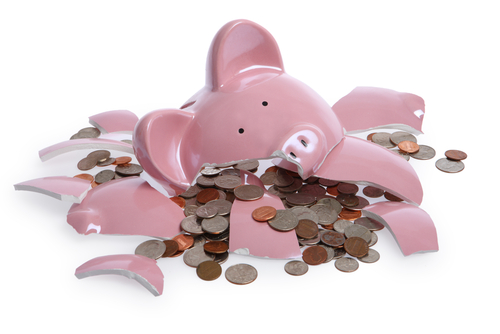How would you react when faced with a financial emergency?
Guest blog post by about Debbie
No matter how careful you are, it’s easy to be caught out by an emergency. These, by their very nature, are out of the blue events that can leave you with a huge, unplanned bill to pay off and no choice as to whether to pay up or not. From things such as flooding to a broken down car, how should you react if you’re faced with this sort of financial emergency?
Review your spending
It’s important not to panic – and also not to bury your head in the sand. Straight away you should pore over your bank statements for the last few months and take a look at your spending. It’s likely that you’re going to need to find some extra money from somewhere to pay for your emergency so what could you cut? Could you switch energy suppliers and save a couple of hundred pounds (Ofgem thinks people can)? Smaller, lifestyle changes can help too. If you pop into a coffee shop most mornings on your way to work you could easily cut this out for a bit and save yourself £15-plus a week. That might not sound a lot, but it’s more than £700 a year. Every single penny you can cut here can go towards paying off your emergency and some changes are so small that they need not be too painful.
It’s also important to know to how much cash you have available to be able to pay off a loan or other form of financial product. You might well need to apply for finance to help you through the worst and the monthly payments could, if you’re not careful, leave you with a big headache for years to come. Assess your ‘disposable income’ and think carefully how much of this you’d be prepared to forego while you’re getting back on your feet. The more you know, the better informed your decision will be.
Look at your finance options
Once you’ve got your house in order, you need to think about how you’re going to pay off your out of the blue expense. Do you have enough money in your savings? While you might be reluctant to raid your account you could, of course, top this back up later. Paying yourself back will give you fewer headaches than paying back a bank. For many people, their savings forma rainy day fund for just this sort of emergency.
If that’s not possible, there are other ways you can proceed. Weigh up different financial products to see which would suit your circumstances. Would a credit card give you some breathing space to pay this back? What rates are available on personal loans?
If you need to obtain finance, then you need to shop around for the best deal and weigh up the true cost to you – including interest payments and any fees or charges that might come as part of the package. You can assess the full cost of borrowing by using a loan calculator. Don’t rush into agreeing to a product that will leave you with an unnecessary burden. Yes, you want to sort your emergency as quickly as possible, but you don’t want to lurch from one problem to another by picking an inappropriate finance option.
Seek out and listen to advice
Finally, it’s really important to talk to those close to you. Your friends and family might well have been through a similar experience and will be able to tell you how they coped – and warn you about any mistakes they made along the way. They can also provide emotional support to get you through the shock associated with some emergencies. Things such as flooding can be a traumatic experience and it’s very easy to let the emotion of the situation cloud your judgement.
If you need help to find someone to carry out some work, for example, your friends and family might well know a trusty plumber, electrician or mechanic to recommend to you so that you don’t get ripped off. They might be aware of a good deal on a credit card or loan from their current provider. Personal recommendations for all of these things can be worth their weight in gold.
In extreme situations you might well want to get the benefit from a professional advisor. There are a host of charities and bodies who can give you their time for free and potentially save you a lot of stress and money. Don’t be afraid to ask – there’s probably much more support out there than you realise, you really don’t have to suffer in silence.
If the worst happens, keep your cool, get a plan together, search out the best option to pay for anything you need to buy and make sure you listen out for good advice from those around you.






